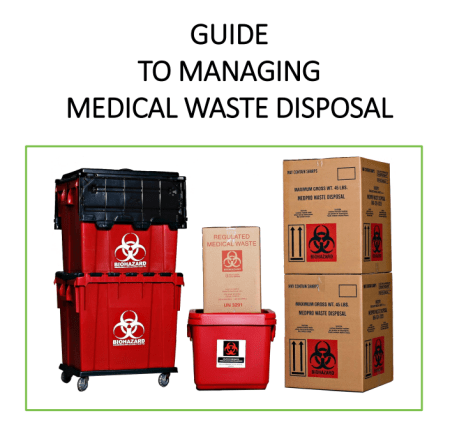Responsible Solutions: Understanding Medical Waste Disposal Solutions
In the world of medical care, the proper disposal of clinical waste is a critical facet that requires mindful factor to consider. As medical care centers create numerous kinds of waste that call for customized handling, comprehending the subtleties of clinical waste disposal services is vital.
Importance of Appropriate Clinical Garbage Disposal
Proper clinical waste disposal is critical in preserving a sanitary and risk-free environment within medical care centers. In health care settings, numerous sorts of waste are produced daily, including transmittable materials, sharps, ran out medicines, and chemical compounds. If not properly handled, these wastes can posture serious threats to both medical care workers and the public. Incorrect disposal can result in the spread of infections, injuries from sharps, contamination of water resources, and injury to the environment.

Kinds Of Clinical Waste
Within healthcare centers, a diverse range of waste products categorized as medical waste is generated, each calling for specific handling and disposal techniques. Pathological waste, which includes cells, organs, and body parts, demands appropriate disposal to value the self-respect of the departed and protect against any kind of biohazards. Recognizing the different types of clinical waste is important for health care facilities to apply efficient waste management strategies and shield public health and wellness and the environment.
Laws and Compliance
Health care centers should comply with rigid regulations pertaining to the handling and disposal of medical waste to make certain conformity with lawful requirements and secure public health. These guidelines are implemented to avoid the spread of infections, protect the setting, and keep the safety of medical care workers and the public. Numerous regulatory bodies, such as the Environmental Security Agency (EPA), the Occupational Security and Health And Wellness Management (OSHA), and the Division of Transportation (DOT), have details standards that medical care centers must adhere to.
To follow these guidelines, medical care centers must properly segregate, store, transport, and get rid of various types of medical waste. This includes sharps waste, infectious waste, contaminated materials, and pharmaceutical waste, each requiring certain taking care of procedures. Facilities has to also maintain precise documents of waste generation and disposal to show conformity during assessments.
Non-compliance with clinical waste laws can cause extreme penalties, fines, and damage to the facility's online reputation. It is important for medical care facilities to remain informed regarding the latest regulations and apply durable conformity procedures to protect public health and wellness and the atmosphere.
Benefits of Professional Disposal Solutions
Involving professional clinical waste disposal services supplies healthcare facilities a reliable and reliable service for handling harmful products. These solutions use qualified specialists that are fluent in handling different types of clinical waste, making certain correct segregation, transportation, packaging, and disposal. Medical Waste Disposal Services.
Moreover, specialist disposal solutions make use of modern equipment and adhere to sector ideal methods to reduce ecological effect and lower the danger of contamination. This not only promotes a safer workplace for healthcare staff yet also adds to total public health and wellness and safety. read Furthermore, outsourcing clinical waste disposal can result in cost financial savings over time by removing the demand for internal administration and disposal systems.
Sustainable Practices in Health Care

One trick sustainable practice in health care is waste reduction. By carrying out methods to lower unneeded product packaging, single-use things, and total waste generation, healthcare facilities can substantially reduce the quantity of waste sent to land fills or incineration. Furthermore, recycling programs for materials like plastic, paper, and glass can further minimize the environmental impact of health care operations.

Conclusion
To conclude, correct medical waste disposal is page crucial in preserving a risk-free and healthy setting for both healthcare workers and the public. Comprehending the various sorts of medical waste, following regulations and conformity criteria, and utilizing expert disposal services are crucial steps in accountable waste management. By taking on lasting methods in health care facilities, we can minimize environmental effect and make sure the wellness of all individuals involved in the health care market.
As health care centers create different types of waste that need customized handling, recognizing the subtleties of clinical waste disposal services is paramount.Within healthcare facilities, a varied range of waste products identified as clinical waste try this site is generated, each needing certain handling and disposal techniques. Recognizing the different types of medical waste is essential for healthcare facilities to implement reliable waste management techniques and shield public wellness and the setting.
By applying strategies to lower unnecessary product packaging, single-use items, and general waste generation, health care centers can substantially lower the amount of waste sent to land fills or incineration. Recognizing the various types of clinical waste, complying with regulations and compliance standards, and making use of professional disposal solutions are necessary actions in responsible waste administration.